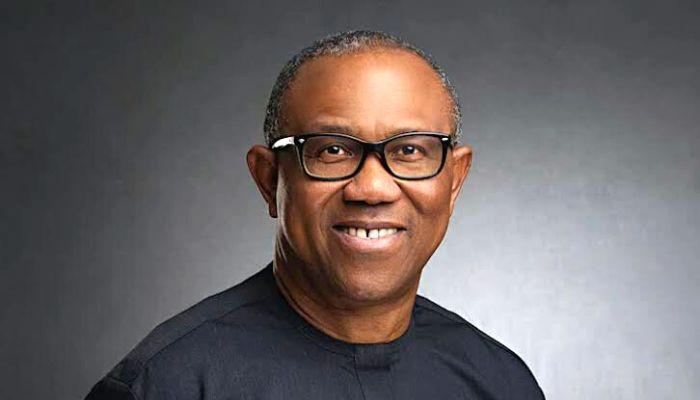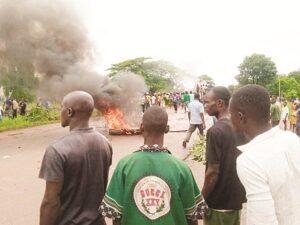


2027 Election: How Labour Party’s crisis may hinder Peter Obi’s chances
By Toheeb Babalola
The Labour Party (LP), Nigeria’s third-force party, is experiencing internal conflicts that mirror the themes of Lawuyi Oguniran’s play, Eégún Aláré.
The play tells the story of ÌÌj¹Ì Larinnaka, a talented masquerade who leaves his pregnant wife and community to seek success elsewhere, promising to return. His son, ÌÌj¹ì Lade, follows in his footsteps and surpasses him in influence.
Similarly, Peter Obi, the LP’s presidential candidate, has gained popularity beyond his party’s initial stronghold in the South.
However, the party’s leadership crisis and internal conflicts threaten its unity and political success.
The Yoruba proverb, ‘Tí ilé kò bátò, ìta kòtò’ (if in-house affairs settle, one should expect the worst outside), highlights the importance of resolving internal issues to achieve external success.
In a strange village, Ìj¹ Lade performed in front of retired masquerades and King, he did not eulogise the retirees while performing. To entertain the large crowd, he transformed himself into a whale, while a man with charm was incantationing. With the effect of charm, a whale could not return back to human being (Ìj¹ Lade). Just as Peter Obi established ‘Obidients,’ a political movement that supports Obi’s presidential ambitions around the world. Members of this group used social media to push their Man’s agenda on political gladiators, leveraging information disorder.
The man, later identified as Ìj¹ Larinnaka, heard the crying whale chanting a dirge with his name as the father. He (Larinnaka) rushed out and confessed that he charmed Ìj¹ Lade into a whale. He sobbed at having unintentionally destroyed his son with his hand. This is simply a scenario currently happening between the Labour Party and its 2023 presidential candidate, Peter Obi.
Once the Labour Party emerged as the third force and began to expand across the nation for the first time since its founding, the party’s leadership began to face problems that caused the public to view the party negatively.
In terms of the party leadership crisis, Nigerians had heard enough of court processes between the factions of Julius Abure (current National Chairman) and Lamidi Apapa (South Vice-Chairman) flying on the national dailies, which seemed inappropriate for their third-force. After the election, Abure was accused of financial misconduct and forgery, which resulted in his suspension. Meanwhile, Apapa was named acting National Chairman by the court, which eventually forced Abure’s supporters to resign and conflict at the party’s headquarters. However, Julius Abure is still presiding over the party.
The party’s stakeholders disintegrated as a result of the presidential candidate’s and his Obidients’ mentality of supporting Julius Abure while ignoring Southwest leaders, thrusting Peter Obi into the leadership crisis. Oneness as a major goal to success has been lost in the party.
Cross-referencing the Southwest, it is evident that the party’s executives in the states of Oyo, Osun, and Ogun are grovelling before the ruling parties for jobs and contracts, betraying the trust the electorate bestowed upon them during the election. And there needs to be unity among the leaders in each of the six (6) geopolitical zones for Peter Obi to emerge a President under the Labour Party in 2027.
Justifying the positions of the Labour Party (LP) and the Nigerian Labour Congress (NLC), they differ from each other academically in terms of their goals. Both, though, share certain parallels.
The NLC is a pressure group that defends worker interests, while LP’s primary goals are member welfare and political power. Ironically, the former is driving and manipulating the controversy that is taking place in the latter, where citizens find it difficult to know the positions of both.
People saw a scene during the Edo State gubernatorial election a few months ago where NLC President Joe Ajero accused Abure of mismanaging the party’s finances, treating the union with disdain, and operating the party like his own company, opposing the National Chairman to hesitate in hand-picking political candidates. NLC, claiming to be co-founded and involved in the LP’s decisions in the public, devalued the party politically.
In the future, more defections are being encouraged in front of the 2027 General Election by the recent behind-closed-door meetings between Peter Obi and the PDP’s gladiators, Atiku and Bukola Saraki. People on the streets predicted that Peter Obi would forfeit his ambition and Obedient movement to once again run as Atiku’s running mate.
Kenneth Okonkwo, a chieftain and Peter Obi’s campaign spokesperson, coming out of his shell to spark defection is an affirmation of his boss’s (Peter Obi) position in the coming months. He said, “Those people are clowns. It is the greatest joke I have ever seen in a political party and then you want to position yourself as a party of integrity. You cannot give what you don’t have. “Aburi and his cohorts, their tenure is over. Let Aburi and his cohorts get behind me. They are workers of iniquity. I don’t rate them. That executive is in charge of the secret society. They should be apprehended.”
Nigerians had heard Peter Obi distinguishing between the Obidient Movement and LP, which he referred to as distinct entities. It is sufficiently clear that his supporters follow him everywhere he goes, leaving the party empty.
It is also clear that if Peter Obi remains in the Labour Party until 2027 without resolving the party’s leadership crisis in all regions, he and his supporters will fall again. Remember how Ìj¹ Larinnaka injured his son (Ìj¹ Lade) with his hand.
To wrap up this discussion, I would like to share a quote from renowned sociologist and political theorist, Max Weber that emphasises the significance of unity in political success.
“Politics is a strong and slow boring of hard boards. It takes both passion and perspective.”
This quotation emphasises how important it is to work together as a team and be persistent in order to accomplish political objectives. While perspective demands a cohesive vision, passion denotes the emotional drive—both essential for long-term political success.



